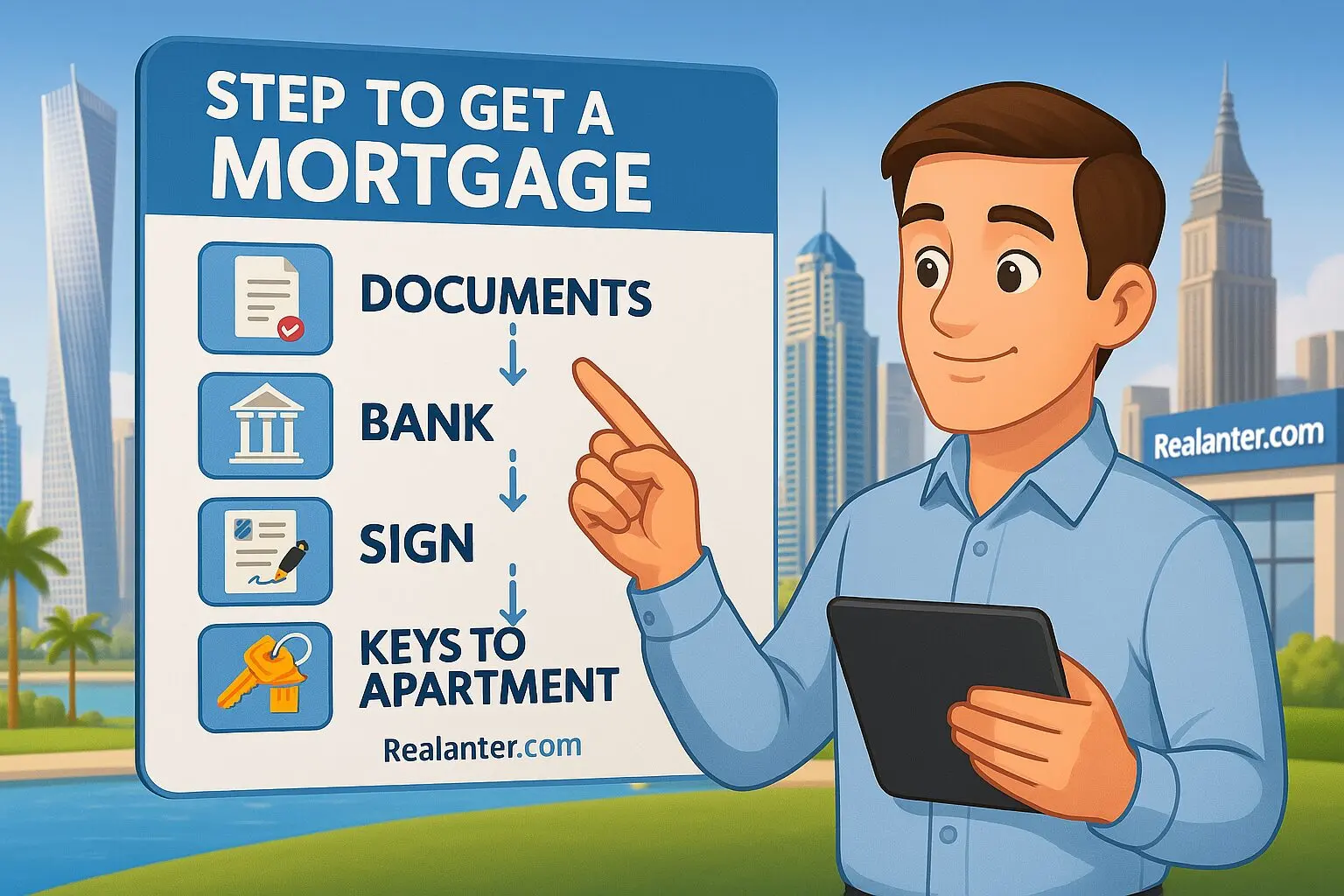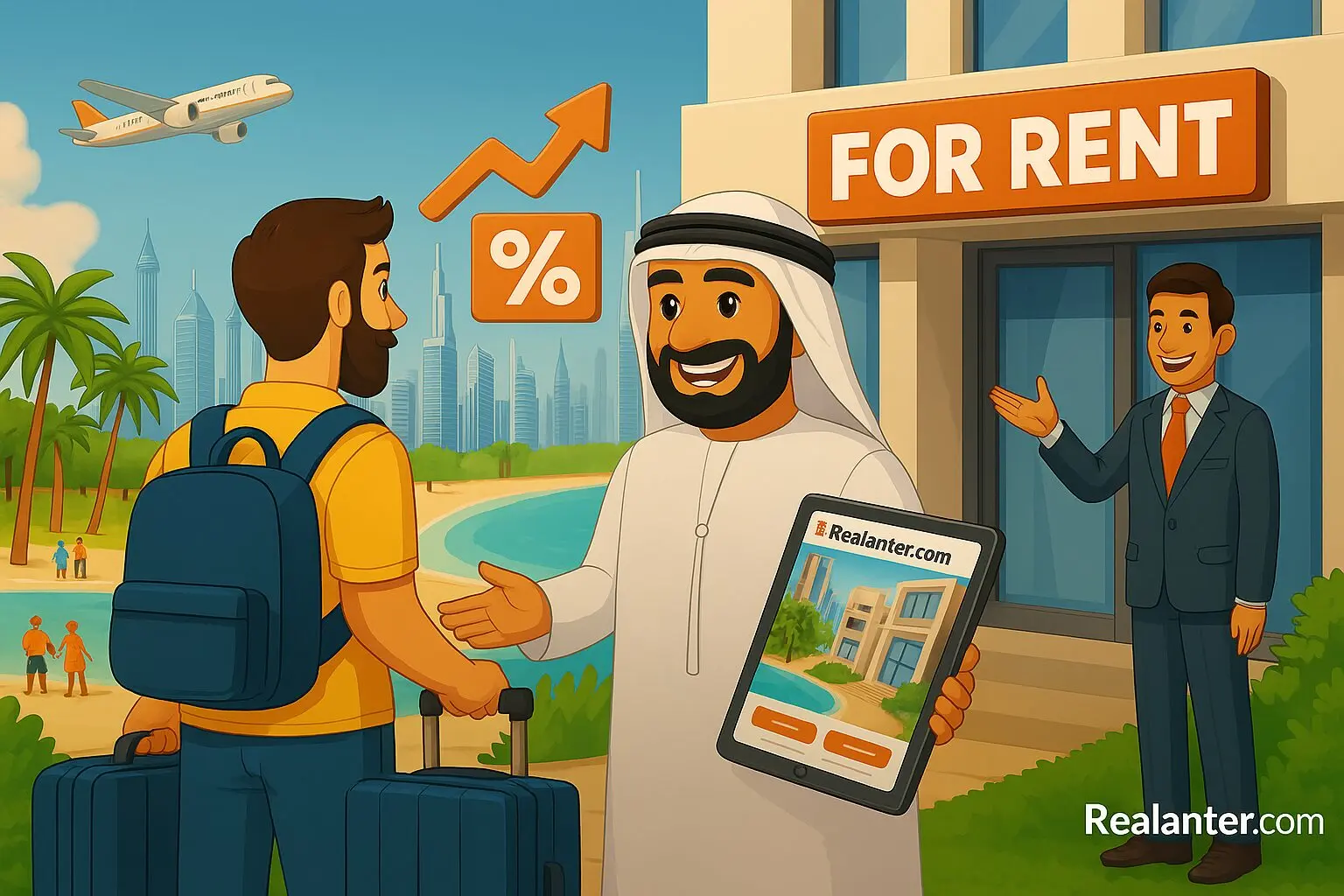Getting a mortgage is probably the best way for foreigners to buy property and is available to all investors from all walks of life and from different parts of the globe who are indentured by the ever-growing trend of real estate investment in Dubai. However, it is still subject to some eligibility requirements, documentation, and financial consideration.
Mortgage Calculator
1. Eligibility Requirements for Foreigners
Foreigners apply for mortgages in Dubai, although requirements vary greatly between residents and non-residents. Generally, banks give loans to persons who are above or equal to 21 years of age but under 65 (employees) or 70 (self-employed) by the time the loan application process draws to its completion. Based on residency status, the loan terms vary, so for UAE residents, the maximum loan-to-value (LTV) ratio can be as high as 80 percent, while non-residents can borrow up to 50 percent.
The disparity, therefore, shows the risk under assignment to a loan from banks to a non-resident. Another point of concern in this issue is the stability of income, which is the basis on which banks lend; the level of income stability will determine the amount of loan to be given.
The minimum monthly salary they may accept would vary from AED 15,000 to AED 25,000, dependent on the lending institution. All outstanding debts or overdue payments must be cleared. Banks conduct proper credit checks before approving loans, and providing non-residents with international bank statements and credit history is paramount to securing a mortgage for foreigners.
2. Types of Mortgages Available
Dubai offers various mortgage forms fitting all forms of financial needs and risk profiles. Fixed-rate mortgages provide stability with constant mortgage interest rates UAE for an initially agreed time, usually commencing from 2.35% per annum. Variable-rate mortgages reflect changes in rate according to market conditions. Though riskier, they tend to be the less costly option if rates go down. Discounted-rate mortgages mean lower rates during the introductory period, only thereafter returning to standard rates, making them attractive amongst first-time buyers.
Offset mortgages operate by linking a savings account with the mortgage balance to reduce interest payments over time. Buy-to-let mortgages are for investment properties kept for rental income and require a larger deposit, 40-50% as opposed to the residential ones. Each of them bears its advantages that suffer from the disadvantages, depending on the buyer’s financial goals and risk profile.
3. Required Documentation
The essential documents for a mortgage in Dubai depend on the residency status. As per the residents of UAE, prerequisites include a photocopy of passport and visa for identification and residency status, obligatory Emirates ID as identification, given proof of income in terms of either certificate of salary or tax returns, and bank statements for the past 6 months to determine factors concerning financial stability, along with proof of residence in terms of tenancy contracts or utilities.
The non-resident needs less documentation, but involves bank statements for the last three to six months indicating a current flow of income plus proof of income in the form of an employer’s letter or tax declaration from the home country; international passport copy, etc. Other documents like property purchase agreement and insurance policies may be needed once the property is selected. It is also important that documents are in order to ensure smooth-processing application.
4. Pre-Approval Process
Getting pre-approved is a vending process while booking a mortgage in Dubai. This form represents your financial status, and it will verify how much you are eligible to cover in the loan’s maximum limit. Pre-approval clarifies your budget and strengthens your position while negotiating with sellers. The documents needed to be submitted to your lender include proof of income, bank statements, and credit reports.
Most banks usually take about two weeks after submitting these application materials before they generate a pre-approval letter for the customer to have a solid frame within which to hunt for property. Pre-approval also allows you to view properties within a defined budget and provides you with an edge in competitive real estate markets. It allows you to act quickly when you find just the right thing, as you will already know how much you can borrow.
5. Down Payment Requirements
The amount which must be paid as down payment varies according to the residency status and value of the property itself.
In at least 20% from total upfront payments, this applied for properties above AED 5 million up to AED 5 million ($1.36 million) for UAE citizens. Residents, however, had to pay at least 30 percent down depending on the property financing Dubai.
A non-resident must make a minimum down payment of 50% whether above or below the value of the property. Buy-to-let properties involve also having to deposit with these residents and non-residents but at a higher percentage, between 40% and 50%.
Therefore, this down payment would be a significant mover for finances associated with a mortgage, as it gives an idea of the risk involved to the lender. With higher amounts paid on a down payment, the loan amount would also be reduced, thus leading to lower monthly repayments and less burden over the loan application process.
6. Loan-To-Value Ratios
The loan-to-value ratio is the amount of finance, as represented in terms of value, that is available to an applicant. Access to higher LTV ratios makes profits even easier.
For residents, an LTV of 80% is possible, enabling them to use leverage for the maximum portion of the property value, allowing them to pay less at the outset.
Nonresidents, on the other hand, can borrow up to 50% of the property value only, indicating to strict lending protocols.
Those who know these limits can set realistic expectations regarding their borrowing capacity and arrange themselves more effectively.
LTV ratio is crucial as it decides how much you can borrow and how cash-wise you can afford upfront.
7. Interest Rate and Terms of Loan
In the case of Dubai, this varies with the type of mortgage.
Fixed-rate home loans in Dubai are about 2.35% per year. The advantage of constant repayment in any month is contained in this situation.
When it comes to variable loan interest-rate mortgages, they flaunt 6.5%-9.5%, depending on how lenders and market conditions shake them.
Variable loans provide the reduced exposure to rates decreases, though they bear the burden of rising payments in case there is a rate rise. Terms of the mortgage are typically confined to 25 years; therefore, borrowers have enough elbow room for repayments over time. The choice between fixed and variable interest rates will depend on your goal for the loan and your risk appetite.
8. Pick the Right Financial Backer
There are various banks in Dubai that offer financing programs for foreign buyers. Leading bankers are
- Emirates NBD,
- HSBC,
- Mashreq Bank,
- Standard Chartered.
Each bank has its set of terms and conditions, such as interest rates, loan repayment periods, and costs.
Emirates NBD, for instance, offers mortgages with an LTV rating of 75% that go as high as AED 15 million, whereas HSBC mandates minimum salaries of AED 15,000 per month and has mortgages limited to certain building projects only.
Assessing which is best suited to your circumstances among lenders with these considerations will be of great benefit. A mortgage broker could guide you through identifying the most advantageous terms and take you to press with the application.

Find the ideal expat mortgage in Dubai
Consult with our independent mortgage advisors today.
9. Legal Proceedings
Legal formalities are also important with regard to securing your mortgage. This includes registering your property within the Dubai Land Department (DLD) along with transfer fees at 4% of the property value with AED 580 ($158) admin fee to be disbursed.
And, as for the mortgage registration fees, it amounts to 0.25% for the loan value plus admin fee of AED 290 ($79).
These forms make you legally compliant with Dubai’s real estate regulations and vested ownership rights. It is advisable that one hire a real estate agent or even a lawyer because they would understand how to carry out these processes for better efficiency and avoidance of possible pitfalls.
10. Effect of Interest Rates on Mortgages
Interest rates in Dubai are a key factor in the affordability of mortgages. The rates are as low as 2.35% for fixed-rate mortgages while variable rates range at 3.79% to 9.5%. The recent cuts to the UAE Central Bank’s base rate have improved ties for the benefit of borrowing rather than paying for it, with the 0.5% cut in late 2024 driving up mortgage activity.
The multiplication of rates gives the homebuyers put into a higher standardized purchasing power and less monthly payment as it is easy financing property by mortgage in Dubai, but careful consideration of fixed or variable alignment with personal financial goals is essential.
Fixed-rate loans provide a consistent payment, as opposed to offerings of changing rates that can yield savings if conditions get better in the market. They recommend talking to a mortgage advisor with respect to prevailing rates and expected rates for the future.
Expert Tips for Foreign Buyers
A clean credit history will work wonders in obtaining a mortgage in Dubai. The banks love applications from persons with good credit histories without arrears or defaults.
Good credit can be built within six months of getting a UAE resident visa, which greatly boosts the chances of getting a mortgage. In addition, foreign buyers should also budget for other costs on top of the down payments and repayments.
These costs include the property valuation fee, which is AED 2,500–AED 3,000, life insurance premiums in the bank’s favor for the loan duration, and any penalty charges for any early repayment.
It is best to engage mortgage brokers who will ease the task of comparing lenders and negotiate favorable terms on your behalf. They will also handle paperwork so as to save you time and stress.
Advantages of Mortgages in Dubai
In Dubai, a mortgage for foreigners presents lots of advantages to foreign buyers. Leverage helps investors buy a luxury property without an immediate burden of cash for the whole price, thus being a little bit easier to enter the real estate market. A tax-free environment definitely adds to affordability as it does not require another financial engagement like income tax.
One more important advantage is that money is expected to stay in Dubai’s real estate market for quite some time as Prime Minister Mohammed bin Rashid Al Maktoum has promised good ground in the legacy from Expo projects and population growth. Also good capital appreciation for mortgaged properties allows for its owners to either enjoy them or rent them out.
Here are three expert opinions with direct quotes from analysts and professionals on securing a mortgage in Dubai:
“The growth we’ve seen despite the increase in interest rates has primarily come from an influx of population and new capital deployed in the real estate sector,” explains Sawan Karia, a property platform executive at Huspy, highlighting how rising demand for homeownership is driving mortgage approval criteria even in a high-interest-rate environment.
“Fixed-rate mortgages are ideal for buyers seeking financial stability, especially expats purchasing off-plan properties in Dubai. They lock in predictable monthly payments, shielding borrowers from market fluctuations,” notes a report by Engel & Völkers, emphasizing the advantages of fixed-rate loans for long-term planning.
“For non-residents, demonstrating financial stability through international bank statements and credit history is essential to secure a mortgage. While terms are stricter than for residents, Dubai’s competitive rates and tax-free environment make it an attractive option for foreign investors,” says Amit Nainani from Lion Mortgages, underlining the importance of documentation and financial planning for non-resident buyers.
FAQs
Both residents and non-residents can apply for mortgages in Dubai under certain stipulations.
Residents are required to pay 20% to 30%, while non-residents should pay 50% minimum.
Two weeks from the date of submission of documents is the average time frame for banks to issue a pre-approval letter after the documents have been examined.
The age of the applicant must be a minimum of 21 at the time of the application and a maximum age of 65-70 years upon loan maturity.
The options include fixed-rate, variable-rate, discounted-rate, offset mortgages, and buy-to-let loans specifically for investment properties.







